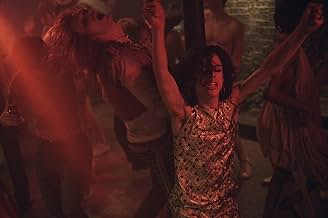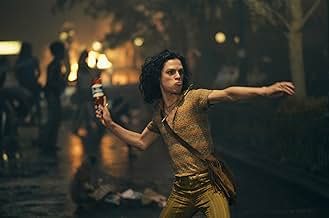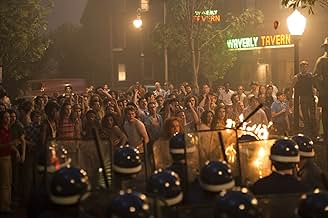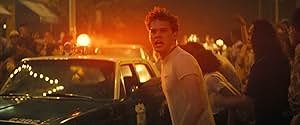IMDb RATING
5.4/10
4.6K
YOUR RATING
A young man's political awakening and coming of age during the days and weeks leading up to the Stonewall Riots.A young man's political awakening and coming of age during the days and weeks leading up to the Stonewall Riots.A young man's political awakening and coming of age during the days and weeks leading up to the Stonewall Riots.
- Awards
- 4 nominations total
Vlad Alexis
- Cong
- (as Vladimir Alexis)
- Director
- Writer
- All cast & crew
- Production, box office & more at IMDbPro
Featured reviews
Government action against homosexuals leads to the 1969 Stonewall Riots in NYC. Danny Winters is a runaway from Indiana. He is befriended by Ray and his group of gay friends. They struggle to find a place in the world.
Everybody is played over the top including the flat doe-eyed Danny. There is only so many Danny jaw drops that I can take. It's overwrought at almost every point. I want to say it's unflinching but it's more like pulp fiction. There are hints of artificiality which are the flat notes of this historical drama. The struggles of the fictional Danny Winters in his home town could be a compelling story by itself. Roland Emmerich's insistence of tying it to the Stonewall Riots is questionable. It's like saying the history cannot be comprehended without a white middle America protagonist. Ray is a more compelling character. The plot is also overstuffed which sidetracks the story and drags the pacing. This is problematic especially considering the needs of this important history.
Everybody is played over the top including the flat doe-eyed Danny. There is only so many Danny jaw drops that I can take. It's overwrought at almost every point. I want to say it's unflinching but it's more like pulp fiction. There are hints of artificiality which are the flat notes of this historical drama. The struggles of the fictional Danny Winters in his home town could be a compelling story by itself. Roland Emmerich's insistence of tying it to the Stonewall Riots is questionable. It's like saying the history cannot be comprehended without a white middle America protagonist. Ray is a more compelling character. The plot is also overstuffed which sidetracks the story and drags the pacing. This is problematic especially considering the needs of this important history.
Gay themed films are n abundance right now and (lesbian couples, transgender stories, more gay characters in many films) so it seems only natural that yet another film be made about the beginning of gay rights in the US. STONEWALL does that and despite the emphasis on political corruption attempting to steal the thunder from the brave gays who initiated the change to Gay Pride it works for the most part.
Many viewers will avoid the film because of the depiction of gays as being homeless, feminine street hustlers – too much so that it becomes a distraction form the other aspects of the story – but at least the message and the dates and the history are there. The plot revolves around the 1969 Stonewall Riots, the violent clash that kicked off the gay rights movement in New York City. The drama centers on Danny Winters (Jeremy Irvine), who flees to New York after an aborted coming out with Joe (Karl Glusman) and being ousted by his homophobic father (David Cubitt), leaving behind his sister Phoebe (Joey King). He finds his way to the Stonewall Inn, where he meets Trevor (Jonathan Rhys Meyers) before catching the eye of Ed Murphy (Ron Perlman), manager of the Stonewall who colludes with corrupt police and exploits homeless youth. Danny becomes close to a group of Nellie hustlers – especially Ray (Jonny Beauchamp) – and it is his association with this gay element that he eventually joins and fights for gay rights.
The cast is strong, the script by Jon Robin Baitz is less than impressive, but director Roland Emmerich manages to make the blend of history and human tragedy credible. Not a great movie, but the intentions are worthy.
Many viewers will avoid the film because of the depiction of gays as being homeless, feminine street hustlers – too much so that it becomes a distraction form the other aspects of the story – but at least the message and the dates and the history are there. The plot revolves around the 1969 Stonewall Riots, the violent clash that kicked off the gay rights movement in New York City. The drama centers on Danny Winters (Jeremy Irvine), who flees to New York after an aborted coming out with Joe (Karl Glusman) and being ousted by his homophobic father (David Cubitt), leaving behind his sister Phoebe (Joey King). He finds his way to the Stonewall Inn, where he meets Trevor (Jonathan Rhys Meyers) before catching the eye of Ed Murphy (Ron Perlman), manager of the Stonewall who colludes with corrupt police and exploits homeless youth. Danny becomes close to a group of Nellie hustlers – especially Ray (Jonny Beauchamp) – and it is his association with this gay element that he eventually joins and fights for gay rights.
The cast is strong, the script by Jon Robin Baitz is less than impressive, but director Roland Emmerich manages to make the blend of history and human tragedy credible. Not a great movie, but the intentions are worthy.
Were it not for Jon Robin Baitz 'Stonewall' would be a less interesting film. His script is narrow focus: the three months leading up to the 'rebellion' at the Stonewall bar on Christopher Street in New York's Greenwich Village. Roland Emmerich use his camera to capture the nights and days of those 90 days that gave rise to Gay Liberation, as seen through the least and most vulnerable of homosexuals--the drag queens, the bum boys and the homeless who risk life and limb by living on the street, and who are at the mercy of the mafia that own the Stonewall and the corrupt police who they pay for 'protection' or whose billy clubs bruise them or the Black Maria that haul them off to prison. Is it by chance that 'Stonewall' opens during Pope Francis' visit to New York? The Roman pontiff came with a message of love the least among us, even the homosexual. What is missing is the context of a US in the throes of 'revolutionary' turmoil in a mass movement against the war in Vietnam and the rise of the Black Panthers, a 'revolutionary' movement of liberation that proved to be an example for a revolt from below. Emmerich's camera recreate the cruising world of the piers, the bars and off screen the death that awaits the rent boys from predators. Baitz slights the Mattachine Society who labored in the years before the ferment of the 1960s for equal rights for homosexuals by peaceful means. He's got it right that the younger homosexuals rebelled on 28 June 1969 at Stonewall, and more to the point, it was the 'despised' drag queens who confronted the police and openly resisted the police, resulting in three days of rage and rebellion that gave rise to Gay Power. He's got it wrong in saying that the drag queens, in the person of Ray, based on the ironic Sylvia Rivera, had no political consciousness, but rose up in a having it had it sense of frustration. Rivera later was a simple member of the Young Lords, an activist group of Peurto Rican nationalists, modeled on the Panthers. 'Stonewall's hook is a young Johnny Appleseed from Indiana thrown out by his father for being gay. Ray adopts Danny Winter and brings into life on the streets. There are a class angle to this since Danny will go to Columbia as a scholarship, thereby escaping the streets, yet firmly gay and proud of his 'sister' Ray and her friends. There is a minor frisson of tension in Danny's kidnap and delivery to a predator who made us strangely think of J. Edgar Hoover, grotesquely tarted up in drag.
Roland Emmerich's biggest mistake was calling the movie "Stonewall" and marketing it as if it were the actual story of the rebellion. It gave people the wrong expectation. It's not a movie about Stonewall. It's a movie about a Midwestern gay man whose story takes place on Christopher street at the time of the riots. It's also in part the story of the first person he meets in New York, played by Jonny Beauchamp, who steals the movie. It's basically a very oddball romance and coming-out story. People wanted an accurate historical epic about the importance of the riots, and the movie isn't that and was never meant to be.
For what it really is, it's a very good movie. Like most "historical" movies there are inaccuracies. The worst distortion is giving Danny the "first brick." That's upset a lot of people, but in the dramatic structure of the movie it's as much about Danny's becoming himself--a gay man throwing away his shame--as it is about the situation he finds himself in. The police are depicted as "bad" in the black-and-white morality of an old-fashioned hero-versus-villain Saturday morning serial. But beyond those inaccuracies and the impossibility of recreating Christopher Street as it was (which seems to be especially upsetting to some New York viewers), the movie is as faithful to its surrounding event as any Shakespeare history play to its, including sympathetic depictions of a very diverse neighborhood of LGBT types.
As a long-time gay activist, I liked the movie a great deal. It feels real as I remember things to have been 46 years ago. I felt a genuine emotional rush during and after the riot. The movie ends with typical historical clean-ups, telling us what became of the real people, like Marsha P Johnson and others who appear in the movie, and mentioning the additional nights of rioting and how they went on to be regarded in LGBT history.
For me the saddest thing about this film is the divisions it's exposed among various components of the LGBT community. This history belongs to all of us, black, brown, white, gay, lesbian, transgender, drag queen, troll, twink, and so on; if we can't honor it in all of our variations, no one else will either. Go to see it as a good story well told, not as a factual documentary. I write this knowing some of you won't be able to, some of you won't want to, and some of you won't believe me. I wish there were something I could do about that, but there isn't.
For what it really is, it's a very good movie. Like most "historical" movies there are inaccuracies. The worst distortion is giving Danny the "first brick." That's upset a lot of people, but in the dramatic structure of the movie it's as much about Danny's becoming himself--a gay man throwing away his shame--as it is about the situation he finds himself in. The police are depicted as "bad" in the black-and-white morality of an old-fashioned hero-versus-villain Saturday morning serial. But beyond those inaccuracies and the impossibility of recreating Christopher Street as it was (which seems to be especially upsetting to some New York viewers), the movie is as faithful to its surrounding event as any Shakespeare history play to its, including sympathetic depictions of a very diverse neighborhood of LGBT types.
As a long-time gay activist, I liked the movie a great deal. It feels real as I remember things to have been 46 years ago. I felt a genuine emotional rush during and after the riot. The movie ends with typical historical clean-ups, telling us what became of the real people, like Marsha P Johnson and others who appear in the movie, and mentioning the additional nights of rioting and how they went on to be regarded in LGBT history.
For me the saddest thing about this film is the divisions it's exposed among various components of the LGBT community. This history belongs to all of us, black, brown, white, gay, lesbian, transgender, drag queen, troll, twink, and so on; if we can't honor it in all of our variations, no one else will either. Go to see it as a good story well told, not as a factual documentary. I write this knowing some of you won't be able to, some of you won't want to, and some of you won't believe me. I wish there were something I could do about that, but there isn't.
I was not previously aware of the negative reviews of this film. And that is a good thing, since they might have deterred me from watching. Having now seen the film, and having done so as A) someone who is old enough to remember firsthand what it was like to be gay in middle America in 1969 (far worse than what is depicted in this film!), B) someone who was disowned and thrown out by his parents at age 17 for being gay, C) a long-time gay activist, and D) a professional historian, all I can say is that the critics need to get past the fact that this is *not* a dispassionate, objective documentary about the Stonewall Riots. Rather, it is a fictionalized evocation of the social, cultural, and political circumstances that eventually triggered the riots. And in that regard, I think the film did an outstanding job. Those born after about 1970 largely have no reason to remember bar raids, police payoffs, anti-cross-dressing laws, or even the overt involvement of organized crime in the operation of many gay bars. And that is in large part thanks to the bravery of the "deplorables" (to use a word circulating in this election cycle) who finally said, "Enough is enough." From my perspective as an elderly gay man who continues to be utterly dumbfounded (and delighted!) by the social changes that gay militants have achieved over the past half-century, I can only say "Thank you" to the makers of this film for at least trying to tell the story in a passionate, subjective manner. If you want cold, emotionless history, tune in to the National Geographical Channel. If you want some sense of what it *felt like* in 1969 (and for many years thereafter), see this film. Is the film "flawless"? No. But despite a few flaws, it is an excellent film.
Did you know
- TriviaThe Stonewall Inn or sometimes referred as Bonnie's Stonewall Inn was originally built as stables in the mid 19th century. By 1930 it became a Tearoom for heterosexuals. The Stonewall Inn first closed in 1964 after 34 year's of business as a Tearoom when the interior was destroyed by fire. It was restored by three mobsters in 1967 as a gay bathhouse and became the largest gay bar in the US. After the riots in 1969 it shortly closed. For twenty years the Stonewall ran as a Bagel Sandwich Shop, a Chinese Restaurant and shoe store before reopening in 1998 as simply Stonewall.
- GoofsThe timing of Danny's arrival in New York is confused. He leaves Indiana during the fall (it's football season, and the World Series is about to start). But his bus arrives in New York in March (3 months before the Stonewall riots).
- ConnectionsFeatured in Identités trans: Au-delà de l'image (2020)
- SoundtracksI Say A Little Prayer
Written by Hal David & Burt Bacharach
Performed by Stingray Music
Courtesy of Stingray Music c/o Covered Records, Inc.
- How long is Stonewall?Powered by Alexa
Details
Box office
- Budget
- $13,500,000 (estimated)
- Gross US & Canada
- $187,674
- Opening weekend US & Canada
- $112,834
- Sep 27, 2015
- Gross worldwide
- $292,669
- Runtime2 hours 9 minutes
- Color
- Sound mix
- Aspect ratio
- 2.35 : 1
Contribute to this page
Suggest an edit or add missing content












































